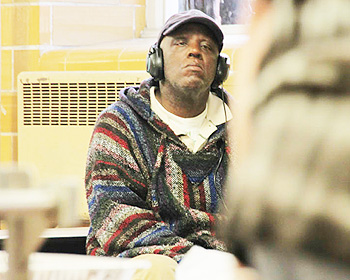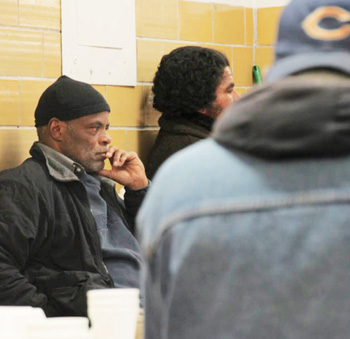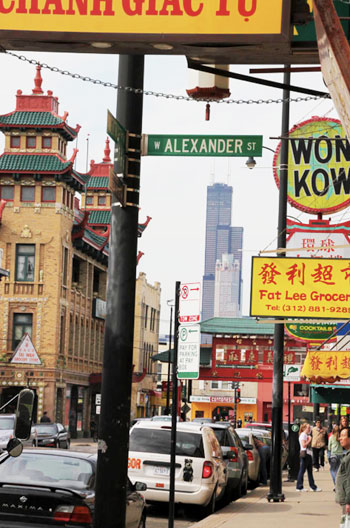politics, society, the Right, USA
The Day I Met Some Conservatives
13 Jul 2010I am completely aware there are lots of conservatives in America. I’ve been bracing myself for meeting them, as I made my way out West. I just didn’t expect to meet them in the form of young people in their early twenties, certainly not college students, and certainly not on public transport in Obama’s home town, the Democratic lock down that is Chicago.
So I accepted a generous invitation of visiting cultural sights such as architect Frank Lloyd Wright’s Chicago home & studio with gratitude, not realising that my hosts for the day (which involved a lot of being trapped in their car) were pretty much Tea Partiers, only young, stylish and attractive. Which, let’s face it, is not the image that normally comes to mind.
In fact the boyfriend and girlfriend couple were nothing but generous, kind and thoughtful to me. I’m just pretty sure that wouldn’t have been the case if I’d been Hispanic. Which was funny, because the girl was half Hispanic – her dad from Peru – and she speaks decent Spanish. But Hispanics, blacks and women drivers came up in the first five minutes (women drivers were actually what started it all off….) and from then on in I knew there’d be trouble (at least if I didn’t keep my mouth shut).
I could have ignored the quip about women drivers – we used to humour him when Grandad started – but that led quickly to a conversation, all the while trapped in the car of course, about how Obama is not culturally black. This is an argument I have realised is fairly valid: Obama is completely atypical of black people in the US, and, dare one mention, is of course half white. Furthermore his family was not an enslaved family, unlike the history of most black families in America. And, unlike almost all black people, he has had a white person’s education at the very best schools and colleges that America has to offer, and money has to buy. Of course, this is a controversial if not offensive argument amongst most progressive Democrats, and understandably so. But at this stage I was still not sure what side of the fence they were falling down on, and I was finding some common ground. I started to become sceptical however after being told that blacks have had 50 years since the Jim Crow laws to pull themselves up by their bootstraps, that this went for Hispanics too, and that Obama was socialising all the banks because he is on a mission to make everything owned by the government.
I was still naive enough at this point to answer frankly the question they put to me about how Obama is perceived in Europe. I gave an answer which I am pretty sure 85% of Europeans would be happy with, that Europeans in general and the British in particular still perceive Obama to be a blessed relief after that “moron” George W Bush.
The silence in the car around me was palpable.
I backtracked, clarifying that W was probably “not the sharpest tool in the box”, and I mumbled something about him being perceived by many in my country to be a puppet of other forces (of which, I did not elaborate). That’s about as two-way as the conversation got the entire day, which we were about ten minutes into. After that, I learned to listen with curiosity, fascination, and, it has to be said, a little each of respect and horror.
The conversation took the form of “you see the thing is Matt, there’s something happening in this country right now that you need to know about, something terrible”. This seems to be a highly popular narrative, and I have heard it since. The most chilling expression I’ve heard: “I hate to think about what will happen to this country if drastic action isn’t taken soon”. Exactly what such “drastic action” entails is potentially violent, certainly extreme, but seldom elaborated. One man I’ve met in Florida since (a Navy veteran in his 60s and a New Yorker by birth) suggested America needs the Joint Chiefs to seize power, now. Obviously the suggestion is barmy, and offensive to all values of a democratic republic, but the arguments that led him to it were – to him – impeccable. He and his veteran buddies also clink their cans of Bud Light (now owned by a Belgian corporation…) and hilariously refer to President Obama as “The Muslim”. Except they’re not kidding.
In the car in Chicago I was treated to lectures on how the press in this country are all hopelessly corrupt and simply print government propaganda. Which is funny, because I thought the opposite. The New York Times was singled out for special opprobrium (it’s my own go-to publication (funnily enough); I now have a friend who is a reporter for them: an honest and careful man). But apparently the New York Times is a deliberate source of socialist lies and distortion that regularly and knowingly prints false front page stories for socialist propaganda purposes, only in order to retract them subsequently on page thirty-seven. Fox News is – apparently – the only news source that tells it like it is.
I’ve heard this since as well.
Such an opinion could not be further from my beliefs or values. For a start I simply don’t believe that the New York Times systematically goes out of its way to print lies (although I do believe its truths are framed through its own, subjective and limited prism). But then, my hosts believe that Fox tells only the simple honest truth (whatever that is).
But then, let’s not talk about lies. Let’s talk about values. I thought we shared some. I was enthusiastic when my young host talked about how you can’t just accept what you’re fed by the corporate media; you have to search and dig, and interrogate and question. That’s the kind of value I share. But then she used that to justify digging for the most right-wing Tea Party extremism, presumably because she was looking for information that fit in with her pre-existing values. Deep values about morality and the way people work.
But don’t we all do that? Find information that fits in with what we already believe?
If that’s so, how can any of us distinguish any independent truth? I’m not sure we can, easily. And we all get information, and the mental framework in which to interpret it, from the people around us. The first thing we can and must do is realise what our own values are, and ask how we got them, and ask how other people get theirs. At least then we can understand something about the filters through which we see the world.
So I’m keen to try to understand these people, even if I know I don’t agree with them.
And after they took me to see Frank Lloyd Wright’s house (a liberal artsy excursion if ever there was one…), they took me to, of all places, a church soup kitchen. As the Catholic church’s carillon played an old German Lutheran hymn in harmony, we helped out in the church hall across the road the three dozen or so homeless people who had come for an afternoon feed; a fairly hearty meal, including a dessert and takeaway sandwich, presented in a polystyrene box.
As soon as they told me about this part of the day I was looking forward to it: a view of the real Chicago – hardly the tourist circuit. Yet as I helped out, handing out meals to people, running to find salt, clearing the tables and sweeping the floor, too many questions occurred to me. If what I was doing was a moral act, why were these people getting fed only once a week? How does one meal a week help anybody? Even if there are other churches in the neighbourhood helping out, is that sufficient? What about the rest of their meals? What about the rest of the day? What about where they have to sleep? What about the cold of the night (and it gets COLD in Chicago, for months at a time – deathly cold), what about their prospects, their medical needs (they probably have more than most), a job, a career dare I ask….., their friends, family?
The longer I spent there, and the more I thought about it, I suspected there was some tragic agenda on the side of the helpers; not to primarily connect with and help other human beings, but to in some way reaffirm their own separateness from the homeless people they were doting on, and to assert a kind of moral authority; certainly to dole out their beneficence. I’m sure this can’t be true of everyone who helps the homeless. But nevertheless the feeling for me was there.
I wondered if this was connected to my hosts’ political views. Where, for example, was the role of the city, state or federal government in helping these people that seemed to be dependent on their church’s charity? Certainly I arrived with the expectation that I would like and respect my hosts more for their helping the homeless. Instead I came away with a whiff of revulsion and a feeling that the whole process was in some way not connecting with my own values at all… or the real needs of the homeless people.
The religious aspect interested me. Religion was obviously important to my young hosts, and they had apparently met each other through their church. I gleaned that the young woman’s political views came jointly from the church and from her mother, clearly a forthright woman, and augmented by Fox News. The boyfriend – who did all the driving but seemed to be more in the mould of chauffeur than leader – seemed clearly under the thumb. His younger girlfriend was far more articulate, strong-willed, vocal, knowledgeable and argumentative. She used these qualities to attack “feminists”, who, apparently are woman that… errr… want to have a job. Like my sister. Or my mother; or her mother, or her mother’s mother for that matter. Because apparently a woman’s role is in the home and “feminists” are under the “delusion” that they need a job, when what they really need is a baby and a husband. That’s what they said. I kid you not. I wondered what this girl was going to do with the English Literature degree that had originally attracted me to her. Sit at home I guess, read, and have babies.
The American political commentator and cognitive philosopher George Lakoff would put my hosts firmly on what he calls the “Strict Father” end of the political spectrum. For Lakoff there are two broad sets of values: Strict Father and Nuturant Parent. Almost everybody has elements of both, yet everybody broadly falls down on one side or another.
My hosts, with their interest in Chinese culture and historical architecture, were displaying “bi-conceptualism” according to Lakoff’s catergories. They displayed caring values that were then paired with their dominant traits of racism and anti-intellectualism (they actually attacked “intellectuals” by name, yes).
Through reading articles such as this one in the New York Times, my impression of Tea Partiers was certainly that they do not identify with the current administration and its policies, and therefore feel that it is not in touch with “their America”. I noted comments such as ““I just feel he’s getting away from what America is,” said Kathy Mayhugh, 67, a retired medical transcriber in Jacksonville.” Lakoff would further explain that they are not sufficiently seeing their Strict Father values reflected in Obama’s government.
I can understand this, even if I can’t wholeheartedly sympathise (especially since I believe these people still, socially, have the upper-hand compared to most of the people they complain about).
The next day my mild-mannered, mainstream-church-going Green Party-member friend in Chicago put forward an explanation even more startling; startling because it is so foreign to the secular British mindset: that hard right-wing Christians are upset with Obama because they perceive Obama to be a strong authority on Earth, and Obama is therefore challenging God.
At face value this seems a breath-taking claim; but I buy it to a large extent: it was OK for an ostensibly god-fearing (or at least god-invoking) George Bush to be President. But for a black man, surrounded by strong “socialist” women such as Hillary Clinton and the hated speaker of the house Nancy Pelosi?
It feeds straight into the idea that right-wingers have “lost” their country; because, frankly, they’re not comfortable around any and/or all of the following: black people, women and so-called “socialists”. The combination all wrapped into one and crowned as a government frankly terrifies them.
And in Lakoff’s terms, God of course is the ultimate Strict Father, whom the women, socialists and blacks on Capitol Hill are disobeying.
Clearly martial law should be enacted soon before God himself reaches down and smites America for extending health care to more citizens.
Does this mean then that Tea Partiers are racist? Yes, I might be going out on a limb, but I am pretty certain there is a large degree of implicit racism, which partly comes from the culture in which many white people are still brought up. Black Americans are still looked down on by much of white America, for reasons that whites are all too quick to justify. The fact that so many black people are still poor (due to structural reasons more than their inability to enact the American Dream of pulling oneself up by one’s bootstraps), only gives whites grist for their argument that black people are more lazy, uneducated, violent, uncultured etc than themselves.
My young hosts in Chicago took me for tea and strange sweets in Chinatown, yet sat there disparaging the Chinese women sitting talking and examining their utility bills across from us, dismissing them, profoundly, as “the people who voted for Obama”.
And then there is the misogyny; and while many right-wingers of course are happy to accept Sarah Palin, it’s because to them she embodies and espouses “traditional” female roles. If not anti women per se, right-wingers are certainly anti feminism: “feminism” is the kind of word that some people in America have trouble spitting, partly because they identify it with abortion (which of course, is against their idea of the will of god). And so anybody who defends a woman’s right to choose (which isn’t even an issue in Britain and on which there is broad cross-party consensus) is labelled a feminist). But then this is hardly a debating point with people who think that any woman who works is stepping out of the patriarchal line.
So, to the right-wingers, it’s hell to look at their government and see a black man and a number of prominent liberal “feminists”. To them, these people espouse and exemplify evil immoralities, and must be opposed.
How did America come to be so divided? How did two sets of values become so pronounced and opposite? I can only think it’s to do with leverage. Those with a degree of power have spotted opportunities to drive a wedge between people in order to emphasise a political difference and leverage their own political and/or financial advantage. They’ve built upon a set of values – present in humans for hundreds of years – in an expert way, including spending millions of dollars on manipulating the language involved. In this way, a country that could share an awful lot more in terms of identity, cohesion and solidarity is at war with itself, with neither side having anything good to say about the other.
And of course the propagation of such values is greately helped by those already wealthy people with a financial interest in their propagation. The Republicans – like Britain’s Conservatives – have always looked out for corporate interests, especially those in the energy industry. They also have a commitment to widening the gap between rich and poor (in practice, so do the Democrats – although they at least claim the opposite). The anti-tax argument is a key plank of the Tea Party/Republican argument because it fits in with rejecting being governed by black men and feminists, who, the subtext goes, wish to increase taxes in order to subsidise the production of black babies (through welfare and the centuries-old white fear of black sexuality), and to kill white babies (through all those feminist liberals having immoral unmarried sex and then aborting the results).
However, even if the the anti-tax position makes sense in such a rabid fantasyland, logically it is the most curious: although most active Tea Partiers are (studies in the NY Times tell us) relatively well off, they are by no means the major sector towards whom tax cuts are targeted. The main beneficiaries of tax cuts will normally be the very rich, and corporations. Indeed the position of the white middle class is currently sufficiently tenuous that they could really use the protection of the state, and for that the state would need more funds from the truly rich. In this way, the (not terribly well-off) white middle class are being co-opted into defending the people who are oppressing both them and lower-income blacks. If the tax burden were redirected to the corporations and the very rich, then the Tea Partiers and the lower-income earners they despise would all have their boats raised together. But because of course that is not the agenda of the people really in control, that’s not going to happen. And because the economy is being run for the benefit of the very rich, not the middle or lower class, and with the acute and sudden housing and job insecurity that brings, many conservative whites of middle income are understandably concerned about “slipping” down from the middle class into a lower income bracket. Which to them of course would be like falling into a hellish pit of single mothers, black gang-bangers, and ‘fun-employed’ socialist pot-smokers.
At the root though of this American Cultural Civil War is not any logic at all. At least not logic about policy positions, incomes, tax burdens or redistribution of wealth. No amount of arguing the facts will convince a Tea Partier of them. Even if the white middle class have a lot more in common with the black working class than they might think, it is hard to convince them of economic ‘facts’ because of the ideologies and values that people hold.
At the root are values.
Looking at and dealing with people on the level of values and identity, rather than trying to argue economic “truths”, might be the way forward in trying to – if not forge some consensus – then to at least understand where the other side is coming from.
This is the main thesis of the book I am currently writing with Rupert Read, Reader in Philosophy at the University of East Anglia.
Needless to say, we all need a spirit of inquiry and curiosity, and a willingness to question traditional media. As my young female host said as she picked up a gay and lesbian community paper in Boystown (why on earth did she take us to Boystown?!) “Looking at independent media is the only way to find out what our government and these queers and perverts are up to”…
You can see my photos from the soup kitchen here on Flickr
 Email This Post
Email This Post
13 Jul 2010 Matt Wootton






Your friend has a point about the queers and perverts. That’s why I read The Phoenix religiously.
I’m not a fan of Lakoff. Partly because I find him waaay too reductive, reductive, partly because I find that his own rhetoric, in valorizing the nurturing mama, isn’t exactly fair; and partly, too, because I’m more a believer than most of my compadres in the needs for a bit o’ the strict father. Or at least the ballsy warrior
.
I also think it’s unfair to say that the root of the divide can be traced to the powers-that-be using culture-war issues to divide-and-conquer (the “What’s the Mattter With Kansas?” theory). That suggests that those-with-whom-we-do-not-agree, or rather, those who do not agree with us, are being manipulated (we, of course, are not). I give these people more credit. If you can get beyond the racism and misogyny, they-and-we are both in fact heirs to a pretty rich tradition of conflict that goes back to Jefferson and Hamilton, and, up here, there’s whiff of the old “self-reliant Yankee” in the Tea Party. Strange, maybe, to suggest that there’s strains of the wild-eyed multiculturalist Emerson in your gay-bashing tour guides, but my point is that I think–based on your sound conclusions–that we we have to give people some credit for acting in good faith, even if they’re batshit crazy.
Thus, in re “The anti-tax argument is a key plank of the Tea Party/Republican argument because it fits in with rejecting being governed by black men and feminists,”–nah. It goes back waaay further than that. Back to Shay’s rebellion. Back, I think, to your Richard II, back to Jack Straw (the original). I won’t deny that todaty’s Teabaggers aren’t susceptible to the kind of weird paranoia you mention (unless the black dude’s Allan Keys and the woman’s Michelle Bachmann), and doesn’t reflect a longing for that world gone with the wind, where everyone knew their place, but the role of government in our lives IS, was, and probably ever shall be the cource of an ongoing and bitter battle between Americans. To be honest, it’s the source the same in my head and heart–I’m a die-hard cultural libertarian who believes you ought to be able to smoke, shoot, and fuck pretty much whatever you like, and an economic bolshie–but I have real problems squaring those two, and I doubt I will in my lifetime. (I lack the ideological conviction of most of my fellow Greens). And there ARE any numbver of Constitutional issues at play, and it’s not easy for me to argue with teh Teabaggers when it comes to the 2nd and 10th amendments.
I’m not sure that’s a bad thing, that tension.
But all in all this is a terrific piece, and belongs in a Harpers or at least Salon. Hope you send these out further than your blog and FB friends. (You are, of course, more than welcome to create an accountat Greenmassgroup.com and post up there–we could use your perspective).
Matt,
This is all a very accurate rendition of things. As someone who has ‘read’ philosophy (I was a major in philosophy at Creighton University in Omaha, NE.) I’d say the thesis for your book is spot on.